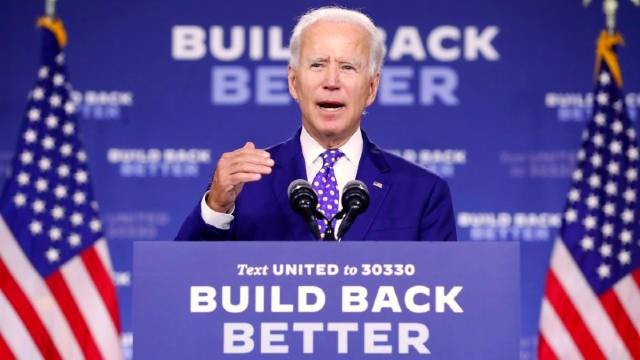Home » Commentary » Opinion » Build back ‘freer’
· Ideas@theCentre
 The Biden campaign this week announced its vision to ‘build back better’ — arguing “this is no time to just build back to the way things were before”. Instead, it’s “the moment to imagine” for a “new economy” where workers enjoy a “fair return for their work.”
The Biden campaign this week announced its vision to ‘build back better’ — arguing “this is no time to just build back to the way things were before”. Instead, it’s “the moment to imagine” for a “new economy” where workers enjoy a “fair return for their work.”
The contest of ideas for post-covid ascendancy is intensifying. But if there’s to be a truly transformative paradigm shift, it must be to unequivocally prioritise building back not to some woke idea of ‘better’ — but instead to build back ‘freer’.
The covid vernacular has constantly evolved throughout the course of the pandemic’s scourge, along with tiresome hypothesised ‘shapes’ of recovery. As competing ideas about what comes next are offered, the only consistent theme is that there’s little enthusiasm for returning to business as usual.
The World Economic Forum has labelled covid-19 ‘The Great Reset’, calling it “a unique window of opportunity to shape the recovery” in an effort to “build a new social contract.”
Reading between the lines of both the WEF and the Biden campaign: dramatic economic upheaval in service of radical progressivism.
Presumably Biden has been motivated by the identically titled — and similarly progressive — policy response package recently conspired by the OECD. Their vision of building back better is couched in the language of building ‘durability’ and ‘resilience’ but is dominated by commitment to structural reform of economies in service of inclusivity and heavily weighted toward economically inhibiting emissions reductions.
Others have similarly pitched bogus ideas for “deploying stimulus for a better world” as cover for introducing radical social and environmental programmes — think ‘Green New Deal’.
An inconvenient problem for such proponents, however, is that the promised ‘green jobs’ don’t neatly match the skills of pandemic-displaced workers (it’s not engineers and advanced tradespeople that have been laid off) nor the current economic deficits (mostly result of incumbered international trade and restrictions on movement). In other words, their proposed solution is to the wrong problem.
As a result, we need to label such concerted efforts for what they are — blatant opportunism.
In any case, in a year in which we’ve suffered an extraordinary whittling of both our individual and economic liberties, the post-covid world should be one that better protects our freedoms.
We’ve suffered unprecedented restrictions of our movement, mandatory orders to use face coverings, and intrusion into virtually every social activity that makes us human. And private enterprise has suffered previously unthinkable suspension of property rights through mandatory shuttering of businesses, and endless prescription on how business is conducted.
But perhaps a legacy of this testing time could be renewed awareness of the (apparently forgotten) perils of unnecessary and excessive expansion of the state — with similar commitment to ‘never again’ as emerged in the wake of the second world war.
Will our leaders be politically courageous enough to demand that we build back freer?
Forget about restraining capitalism and welcoming permanently bigger government in our lives. What we really need is commitment to promoting individual freedoms — not shunning them. And to embrace — rather than curb — free markets.
Build back ‘freer’